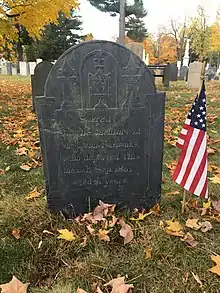Jason Fairbanks
Jason Fairbanks (September 25, 1780 – September 10, 1801) was an alleged American murderer. Fairbanks came from a prominent family in Dedham, Massachusetts. He was the son of Ebenezer and Prudence Farrington Fairbanks and lived in the Fairbanks House, today the oldest wood-framed structure still standing in North America. He was left with a lame arm after a having smallpox as a child which was treated with mercury. His sixth cousin, once removed, was Vice President Charles Fairbanks. Jason's trial and attempted escape were national news in 1801.
Jason Fairbanks | |
|---|---|
 Gravestone of Jason Fairbanks | |
| Born | September 25, 1780 |
| Died | September 10, 1801 (aged 20) |
| Criminal status | Deceased |
| Conviction(s) | Murder |
| Criminal penalty | Death by hanging |
| Part of a series on |
| Dedham, Massachusetts |
|---|
 |
| History |
| People |
|
| Places |
| Organizations |
| Businesses |
| Education |
History
Fairbanks had been courting Elizabeth Fales, the daughter of Nehemiah Fales. Her family claimed she was resistant to marrying him, but friends said they seemed very much in love. On May 18, 1801, Fairbanks met with Fales in a birch grove next to "Mason's pasture" in Dedham, though the exact location today is not known. What happened there cannot be proven, but Fairbanks appeared about 2 hours later at the Fales house, covered with blood and holding a knife. He told them that their daughter had committed suicide and he had tried to do the same but could not. She had been stabbed 11 times, including once in the back. Elizabeth's funeral was held on May 20th.
Fairbanks' wounds were serious; he was in no shape to be taken directly to jail. He was therefore taken into the Fales household, where he received medical treatment. On August 8, 1801, the trial, which would last 3 days, began. The prosecution claimed Jason tried to force Elizabeth (Betsy) to marry him, and when she did not agree he stabbed her. His wounds were received as she tried to fight him off and he stabbed her in the back as she tried to run away. The defense claimed Elizabeth was so distraught that her family did not approve of Jason that she tried to commit suicide. Jason was very sickly and weak, and had no use of his right arm, and the defense claimed he would not have been able to overpower Elizabeth. They proved that the stab wound in Elizabeth's back could, at a certain angle, have been self-inflicted. Jason claimed he froze in shock when she began stabbing herself and then felt so guilty for not stopping her that he tried to kill himself to join her, but was unable to. After only 2 hours of deliberation the jury indicted Fairbanks for the murder of Fales and he was jailed in Dedham.
James Sullivan, the Attorney General of Massachusetts, handled the prosecution. Harrison Gray Otis and John Lowell, Jr., two prominent Federalist lawyers, defended Fairbanks. He was found guilty of the murder and was sentenced to death by hanging.
Escape
Before the execution could take place, Fairbanks escaped with the help of his brother, a cousin, a friend, and his nephew, Nathaniel Davis. A $1,000 bounty was placed on his head, and a newspaper headline screamed "Stop the Murderer!" The party tried to make their way to Canada, but stopped to eat in Skenesboro, now known as Whitehall, New York, just south of the Canada–US border. Fairbanks was recaptured.
Fairbanks was returned to the Boston jail, for authorities no longer trusted the Dedham jail, and on September 10, 1801, Fairbanks was hanged at a massive event. He was twenty years old. Two Army cavalry companies and a volunteer militia unit made sure he did not escape again, and the 10,000 people who showed up at the Town Common to witness the execution were five times the town's population at the time.
Within two days of his execution, the Report of the Trial of Jason Fairbanks was published. The story was then written up in a pamphlet entitled A Deed of Horror! Trial of Jason Fairbanks for the Murder of His Sweetheart in 1801. It became the basis for a novel called The Life of Jason Fairbanks: A Novel Founded on Fact, which is believed to no longer exist. Ebenezer Fairbanks Jr. (Jason's brother) spent a great deal of time and money long after Jason's death trying to prove his innocence and change public opinion, though was never successful.
He was buried in the Old Village Cemetery in Dedham.[1]
References
- Slugger O'Toole. "Gravestone of Jason Fairbanks". Wikimedia Commons. Retrieved October 26, 2019.
General references
- Freeman, Dale H. Melancholy Catastrophe! The story of Jason Fairbanks and Elizabeth Fales, Historical Journal of Massachusetts, Winter 1998.